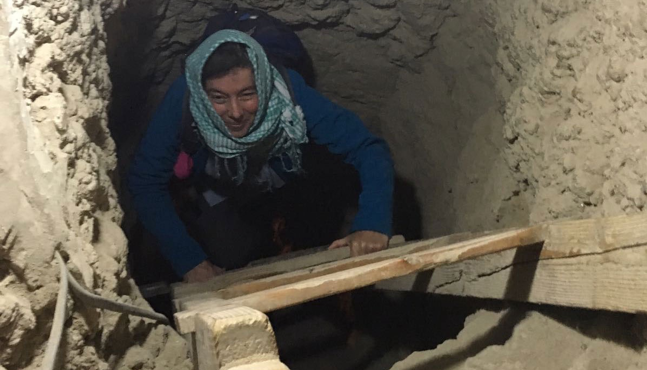Discussions around International Women’s Day #1 – Judith Bunbury, Senior Tutor
2019-03-04

Judith emerging from an Old Kingdom tomb at Maidum, Egypt (Ian Ostericher)
What does International Women’s Day mean to you?
A chance to celebrate the place of women in the world. One year “yom el-sitt” fell during fieldwork in Egypt. Our team enjoy dancing so we all celebrated with break for dancing during the working day. Afterwards Omer, our foreman, asked what was different on International Womens’ Day than any other day – his view is that women are important every day!
You’ve been at St Edmund’s for (how many years now?!), how have you found it as a place for nurturing female academics (student and Fellow)?
I have been at St Edmund’s for nearly 22 years. As a young postdoc, trying to establish my academic career, I found the precarious nature of early career contracts difficult. It was the encouragement of colleagues at St Edmund’s that kept me going and helped me to find a way through. I hope that, over my time as Senior Tutor, I have been able to give back a little of the wonderful support that I have received.
What would you like the College to be doing to nurture the next generation of female academics?
 Many young female academics have come to ask me about how to manage the combination of research work and children. There is no universal answer but I think that to be honest about the challenge that combining parenting and research poses and offering of models of how to survive it is helpful. In my case, I left the lab and moved my research into expeditionary fieldwork. It may seem counterintuitive but the concentrated effort and high rate of discoveries possible on expedition means that I can make the most of being with my family when I’m in the UK. They have even enjoyed travelling with me. (attached image of my daughter aged 10 noting the discovery of an ancient well in the Sahara).
Many young female academics have come to ask me about how to manage the combination of research work and children. There is no universal answer but I think that to be honest about the challenge that combining parenting and research poses and offering of models of how to survive it is helpful. In my case, I left the lab and moved my research into expeditionary fieldwork. It may seem counterintuitive but the concentrated effort and high rate of discoveries possible on expedition means that I can make the most of being with my family when I’m in the UK. They have even enjoyed travelling with me. (attached image of my daughter aged 10 noting the discovery of an ancient well in the Sahara).
Who is the most inspiring woman to you and why?
In my field, I love the work in the early 20th Century of Gertrude Caton-Thompson. She was an expeditionary archaeologist in the time of travelling by camel caravan. She was undaunted by the challenges including ornery camels and made some of her seminal discoveries when the caravan was running short of water. The rest wanted to press on but she still insisted on making some crucial observations at ancient springs before running on to the oasis. She was also early in recognising the contribution to be made to archaeology by geologists and took the geologist Elizabeth Gardner into the field with her. Although Gertrude was offered the Disney Professorship of Archaeology, she declined it – she had other fish to fry and her work in Egypt is still cited today.
If you could say one thing to empower female academics, what would it be?
Good research requires courage and leadership – copy the best you see in all those around you and find a style that works for you – there is no ‘right’ answer!
How will you mark International Women’s Day this Friday?
Friday is a busy day in Cambridge for me and I hope that I can continue to encourage all those around me both in the College and in the University.
This short piece is one in a series running through the week culminating on Friday 8 March with International Women’s Day. Keep your eyes open for the next piece!

